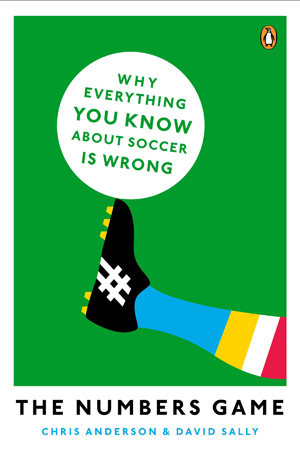Data analysis changes everything – even soccer
By Linda B. Glaser

For well over a century, baseball fans have pored over statistics on players and games, trying to determine what makes a winner. The revolutionary analysis in Michael Lewis’ 2003 book “Moneyball” catapulted baseball data into the 21st century – and a new book by Cornell government professor Chris Anderson is about to do the same for soccer.
“The Numbers Game: Why Everything You Know About Soccer Is Wrong” (Penguin Publishers), co-authored with David Sally, analyzes soccer data that’s been collected for the last decade to reveal patterns that break sharply with conventional wisdom. Perhaps the book’s biggest revelation is that the weakest players are more influential in determining wins and losses than the highly expensive and sought-after team superstars. The weaker players are more likely to make mistakes, such as committing unnecessary fouls, that result in a loss.
And despite all the money poured into training, coincidence and luck turn out to be the deciding factor in almost half of all goals.
When “The Numbers Game” was released in Europe earlier this year, it generated controversy in such high-profile outlets as the BBC and the Times of London. Performance data is relatively new to soccer, and while some coaches are comfortable turning to mathematicians and programmers to develop a winning strategy, others have resisted the trend.
“The story that played out in baseball is playing out in soccer,” says Anderson. “Some people embrace the ideas and are curious; others are opposed to looking at the sport through the lens of data. I anticipate that the reaction in the U.S. is likely to be more accepting than in Europe, because U.S. sports fans are more used to numbers being part of sports, so the approach is more comfortable to them.”

Anderson hopes that the book will encourage interest in soccer in the United States. “The book gives people new to the game a way of understanding it that they didn’t have before,” he says. “In Europe, conventions are more deep-seated, but we hope to help spur innovation in the U.S. in how teams are coached and to help professional and college teams make better decisions.”
Anderson’s interest in soccer is long-standing; he played as a child in Germany, then semi-professionally after high school in Germany’s fourth division. When he figured out he wasn’t good enough to play professionally, he went to college. He first began looking at soccer scientifically after he read “Moneyball” and grew curious whether anyone was doing similar data analysis with soccer. No one was.
“As a social scientist, the tools of my trade have to do with manipulating big data sets, so I had the methodology and the background to analyze data in soccer,” he explains, “and it was a natural extension of my other work on the political economy of sports.”
Anderson’s other works include “Losers’ Consent: Elections and Democratic Legitimacy” (2007) and “Blaming the Government: Citizens and the Economy in Five European Democracies” (1995).
Linda B. Glaser is staff writer for the College of Arts and Sciences.
Media Contact
Get Cornell news delivered right to your inbox.
Subscribe